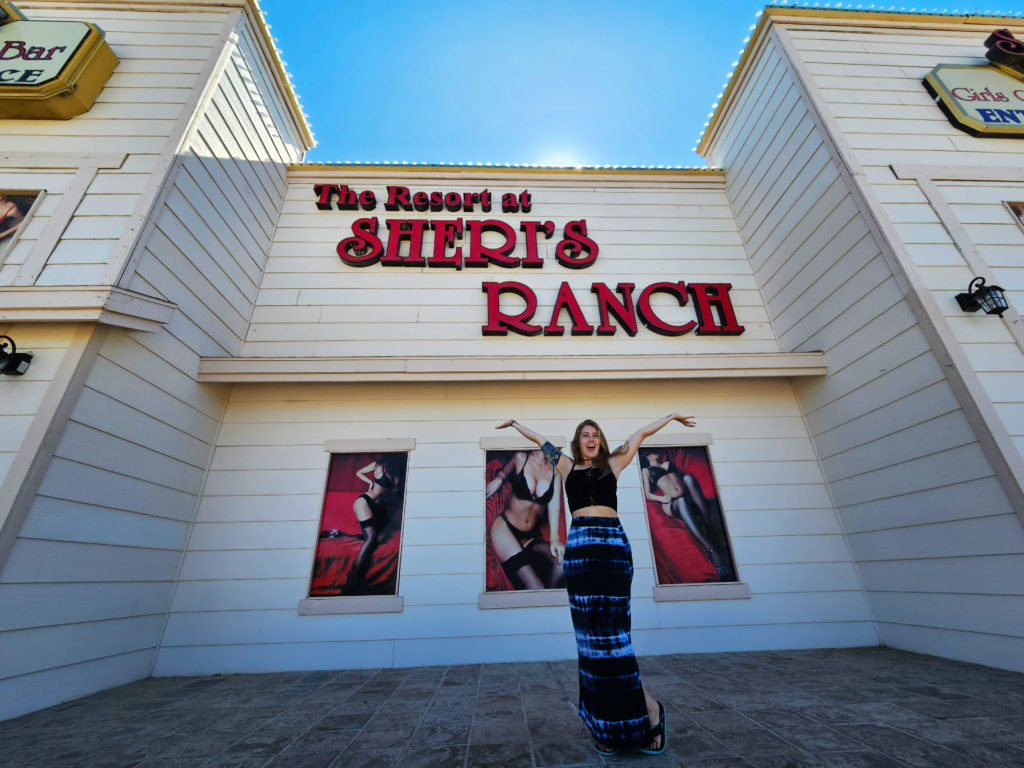Electra Rayne is an adult performer/producer, online content creator, and featured courtesan at Sheri’s Ranch, here to talk today about different terms for sex workers.
I recently received an email from a prospective client who noted that his upcoming visit to Sheri’s Ranch would be his first time “using an escort service”. While I understood what he meant (in this case, that he had never previously paid for sex), I found it an interesting way to say so, seeing as Sheri’s is not technically an escort service. Traditionally, “escort” is used to refer to hired companions who accompany clients to dinner or events, before possibly (but not always!) offering sexual services at the end. In some cases, this framework puts escorting into a legal gray area–not quite prostitution, but not removed enough to be free from scrutiny either. Here at Sheri’s, we are strictly a legal brothel. The ladies only provide services onsite at the ranch, and do not accompany clients elsewhere. So yes, while I certainly do exchange sex for money, I am not most people’s definition of an escort.
My name is Electra Rayne. I’ve been a Courtesan at Sheri’s Ranch since February 2023, and I also have a degree in linguistics from Northwestern University. In addition to my work at the ranch, I make TikTok videos wherein I aim to educate the public on safer (and better!) sex, laws around sex and sexuality, and–most commonly–my job at Sheri’s. Many people, both within the US and internationally, have no idea that full service sex work is legal in any form in the US, due to a pervasive myth that prostitution is federally illegal, rather than regulated by the states. Whether they had previously heard of us or not, many viewers are curious to learn about how our brothel works, how we ladies stay safe, and what our day-to-day looks like at work. At the time of writing my account has around 125k followers, and my brothel-related videos regularly see viewership in the millions. With an audience that size I get a lot of questions, not to mention plenty of criticism. People’s reaction to me, my work, and my content can vary wildly, from fully supportive to downright hateful. While it’s been a joy to see just how many supporters we have out there, and even more rewarding when I hear someone’s views on sex work have been changed or influenced by my content, unfortunately, the stigma against Sex Work is still alive and well.

On TikTok, I have to be creative in how I answer questions and present information, as the app is famous for censorship based on word choice. This is an app where creators have invented words like “unalive” (kill) or “recreational gardening” (consuming marijuana) to avoid being deplatformed, so to discuss my work at the “Spicy Ranch”, I’ve had to get a little creative. The most well-known words for my job–”hooker”, “whore”, and “prostitute”–are all certainly no-gos. Fortunately, so far, “Courtesan” has done okay from a censorship standpoint, though this term has lead to an additional problem: comments from viewers arguing that I’m using a euphemism to somehow make my job appear “better” than it really is, or to distance myself from the “reality” of the work that I and my colleagues do. Truthfully, distancing myself from the reality of my work is the opposite of my goal. In addition to avoiding censorship, there’s another reason I’ve chosen this specific word.
The word “Courtesan” originated in the 1550s as a derivative of the French “courtisane”, meaning a member of the Court. Courtesans were originally specific prostitutes who saw high-status clientele, often wealthy politicians or royalty. These days, “Courtesan” is actually the legal job title for us legal brothel workers in Nevada, at least here in Nye County. Not only is it printed on all of our legal paperwork, when we apply for and renew our work licenses (which we get quarterly), we need to designate “Courtesan” as our job. So, in calling myself a Courtesan in my content, I am really just following the laws and standards outlined by Nye County and the state of Nevada that allow me to do this job legally.

Personally, other terms for my job don’t inherently offend me. I think how a word is said is much more important than the specific word used (I’d certainly rather hear a client talk about how much they “love whores!” versus hearing someone say “Ew, I can’t believe you’re a sex worker!”). I have been known to lovingly call myself a hooker and a whore, because to be perfectly honest, I am! I love my job and I’m proud of the work that I do, and I do not feel the need to sugarcoat it, except as necessary to avoid censorship. When the aforementioned prospective client emailed about his first time using an “escort service”, I wasn’t offended. I simply thought it was an interesting reminder of how euphemisms can become genericized over time, and lose nuance or connection to their original meanings.
Arguably the most ubiquitous term for ladies in our profession in America is the P-word: the infamous “prostitute”. Similar to “escort”, this is another tricky and nuanced example. Very few sex workers self-identify as prostitutes, and some even find the word offensive for a variety of reasons, most notably the extreme stigma associated with it. As Australian sex work researcher Lizzie Smith put it over a decade ago, “the term ‘prostitute’ does not simply mean a person who sells her or his sexual labour…but brings with it layers of supposed knowledge about her worth, drug status, childhood, integrity, personal hygiene and sexual health.” The tight-knit associations with the word are even evidenced on TikTok, where I often receive comments like “courtesan? you mean a legal pr*stitute? how old were you when your parents disowned you?” (I am close with both of my parents, and they both not only know about my job, but support me.)
Beyond just the stigma associated with the word, “prostitute” can be a harmful term because of its strong ties to criminalization. “Prostitution isn’t a job, it’s a crime” is a common refrain I hear both from critics of sex work (arguing the profession is both immoral and invalid as “work”) and sex workers (arguing against the usage of this specific term) alike. Even Nye County formally struck the term “prostitute” from the codes and laws outlining brothel licensing and operation years ago.

For me specifically, the word “prostitute”, like “escort”, is another term that simply feels inaccurate in reference to my work–I’m not a prostitute, because in the USA it is illegal to be a prostitute, and I have gone out of my way to ensure that all my work is legal. I’m not offended by the term or bothered when folks use it, but it also doesn’t feel particularly accurate. In fact, when I’m asked to give interviews or appear for public speaking, I am always very careful to call myself a “brothel worker” rather than a prostitute or a FSSW (full service sex worker). This is not to posit myself as somehow better than anyone else who sells sex, but really the opposite. I am aware that there is an immense amount of privilege in being able to do this job legally, without fear of arrest or violence, and I know that my experience directly selling sex is atypical. I would never want to represent myself as more qualified on the topic than I am, nor to speak over those with lived experience different from my own.
As a Courtesan with the privilege of a public-facing platform, I’m all about offering more than just sex, or even companionship. I’m thankful for the opportunity to educate so many people on what we do and why our work–and the language we use to describe it–matters. After all, the language we use can impact how we think, feel, and make laws. One of my favorite parts of my job has always been the positive impact I get to have on my clients’ lives. Now, with my newfound online audience, I am able to reach more people than ever, to the benefit of both my online viewers as well as my community.

